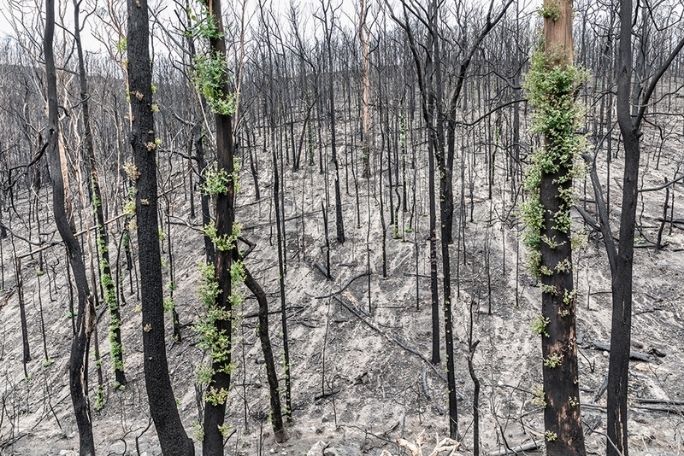Lesson summary
This lesson includes an incursion that focuses on the positive impacts of natural hazards on environments. Students will begin by watching a video that details positive impacts of various natural hazards on environments. The incursion will involve information presented about natural hazards in the local area, positive impacts of these hazards, cultural views on the natural hazard and increasing community awareness. Students will then write a pledge or action plan detailing how they will take the lessons learnt from the incursion and increase their and their family’s knowledge about positive impacts of natural hazards.
The lessons in this unit are designed to inform students about natural hazards in the local environment and ways to reduce risk, prepare, respond and recover from a disaster or emergency.
Learning intentions:
Students will...
- understand that natural hazards are part of the cycle of nature and serve a purpose
- understand that human interactions with natural hazards are what can make them seem only negative
- understand that there are people in the community with knowledge about natural hazards
- understand that there are community, ecological and cultural views on natural hazards.
Success criteria:
Students can...
- identify positive effects of natural hazards
- communicate with a local expert on natural hazards in the community
- explain steps they can take to inform themselves and others about the positive impacts of natural hazards.
Lesson guides and printables
Lesson details
Curriculum mapping
Australian Curriculum content descriptions:
Year 7 Geography:
- Causes, impacts and responses to an atmospheric or hydrological hazard (ACHGK042)
- The way that flows of water connects places as it moves through the environment and the way this affects places (ACHGK038)
Year 8 Geography:
- Economic, cultural, spiritual and aesthetic value of water for people, including Aboriginal and Torres Strait Islander Peoples and peoples of the Asia region (ACHGK041)
- Causes, impacts and responses to a geomorphological hazard (ACHGK053)
Year 7 Science:
- Scientific knowledge has changed peoples’ understanding of the world and is refined as new evidence becomes available (ACSHE119)
- Science knowledge can develop through collaboration across the disciplines of science and the contributions of people from a range of cultures (ACSHE223)
- People use science understanding and skills in their occupations and these have influenced the development of practices in areas of human activity (ACSHE121)
Year 8 Science:
- Scientific knowledge has changed peoples’ understanding of the world and is refined as new evidence becomes available (ACSHE134)
- Science knowledge can develop through collaboration across the disciplines of science and the contributions of people from a range of cultures (ACSHE226)
Syllabus outcomes: GE4-1, GE4-2, GE4-3, GE4-4, GE4-5, SC4-15LW, SC4-17CW, SC4-13ES
General capabilities: Literacy, Intercultural Understanding
Cross-curriculum priority: Sustainability, Aboriginal and Torres Strait Islander Histories and Cultures (OI.2)
Relevant parts of Year 7 Geography achievement standards:
Students describe geographical processes that influence the characteristics of places and how the characteristics of places are perceived and valued differently. They explain interconnections between people and places and environments and describe how these interconnections change places and environments. They propose action in response to a geographical challenge, taking account of environmental, economic and social factors.
Relevant parts of Year 8 Geography achievement standards:
Students explain geographical processes that influence the characteristics of places and explain how places are perceived and valued differently. They explain interconnections within environments and between people and places and explain how they change places and environments. They propose action in response to a geographical challenge, taking account of environmental, economic and social factors.
Relevant parts of Year 7 Science achievement standards:
Students describe situations where scientific knowledge from different science disciplines and diverse cultures has been used to solve a real-world problem.
Relevant parts of Year 8 Science achievement standards:
Students examine the different science knowledge used in occupations. They explain how evidence has led to an improved understanding of a scientific idea.
This lesson is part of the wider unit of work Disaster Resilience Education – Years 7 & 8
Time required: 80 mins
Level of teacher scaffolding: Medium – facilitate class discussion, lead students in activities, monitor behaviour and engagement during the incursion
Resources required
- Device capable of presenting a video to the class
- Sample Pledges – digital or printed copies
- Student Worksheets – one copy per student
Skills
This lesson is designed to build students’ competencies in the following skills:
- Communication
- Community engagement
- Cultural understanding
Additional info
These lessons were designed in consultation with the Australian Institute for Disaster Resilience.


Welcome back!
Don't have an account yet?
Log in with:
By signing up to Cool.org you consent and agree to Cool's privacy policy to
store, manage and process your personal information. To read more, please see
our privacy policy here(Opens in new tab).
Create your free Cool.org account.
Many of our resources are free, with an option to upgrade to Cool+ for premium content.
Already have an account?
Sign up with:
By signing up to Cool.org you consent and agree to Cool's privacy policy to
store, manage and process your personal information. To read more, please see
our privacy policy here(Opens in new tab).